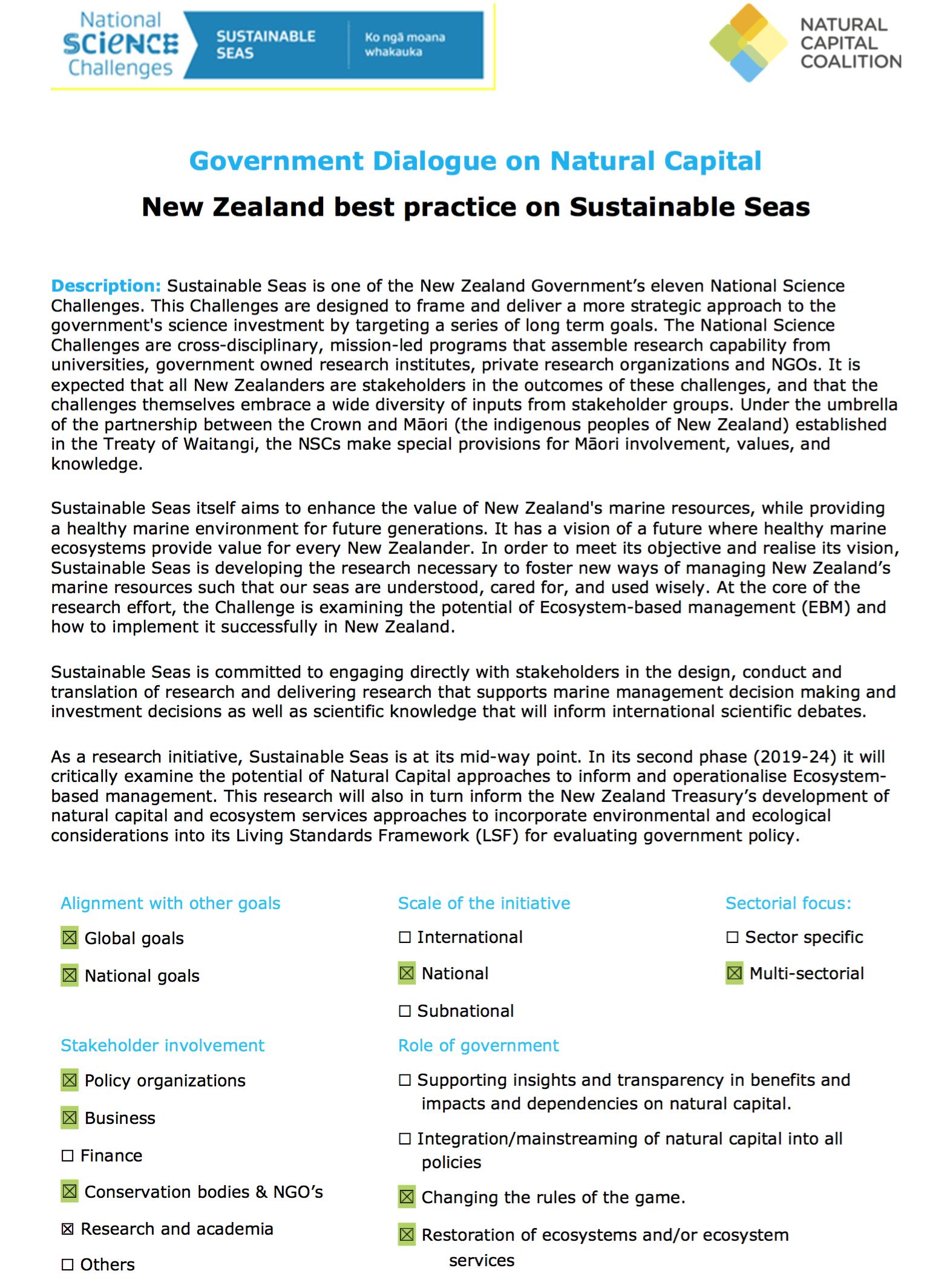The organization/ department in brief
Sustainable Seas National Science Challenge (Creating a Blue Economy Project). The case study is one of multiple projects funded under the challenge.
Why was this undertaken?
The project is exploring potential transition pathways to a blue economy in New Zealand. A blue economy is one defined as an economy ‘that works innovatively with marine resources to add value, improve livelihoods and enhance ecosystem health’. This definition emphasizes the links between high value added activities and healthy ecosystems, and is part of a wider program of research committed to generating sustainable seas in New Zealand. At its core, creating value from a blue economy is about encouraging economic practices that will enhance ecosystem health rather than trade-off ecosystem health against economic growth. The project is exploring a range of different pathways to a blue economy. Ultimately what needs to change are investment, production and market practices. Economy must be done differently. The application of natural capital thinking and measurement tools is one potential approach to (a) redirect state or other collective forms of investment; and/or (b) fashion regulation and environmental management by regulatory bodies that might guide transitions in private sector and consumer behavior to a blue economy.
What was the scope?
The objective of this study is to explore the potential of natural capital and ecosystem services approaches as one set of thinking and measurement tools among many for stimulating a blue economy. The crucial question is how its thinking and measures might interact with decision making at the key sites and moments where transitions are required. These sites are of course manifold and multiply scaled, and the academic literature has questioned the value of natural capital thought and measures at many of these sites and moments. The issues include the level of accuracy of measurement (and associated questions of data availability, scale, detachment of sites of impact from biological and ecological processes in oceans and so on), the ways in which measures will become connected to power relations in their application in resource management, the new power relations that will emerge from any adoption, and whether natural capital approaches will support a transition to new forms of economic practice rather than simply change the rules around trade-offs. They will clearly offer a new management tool but will this support (a) regulatory reform and/or a regulatory framework better designed to deliver transition to a blue economy in the specific case of New Zealand, given its particular marine economy, ecology, and regulatory structure (especially commitments to a Treaty partnership with Maori that recognizes Maori principles and practices of kaitiakitanga); and/or contribute meaningfully to other forces of transitions, be they political (such as the work of community organization or NGOs), consumer-centered, social enterprise related, or embedded in commitments made by investors and producers themselves.
What were the results?
The project is still underway. What is clear is that Treasury is committed to a Four Capitals approach to forming and evaluating policy, so we are likely to see increasing demand for the production of natural capital and ecosystem services measures. Some of that demand is flowing through Statistics New Zealand, who are in the early stages of experimenting with measures. These approaches will be difficult to develop in marine areas where the ecological processes complicate the development of measures at specific scales and crucial data is contested and comprehensive data is expensive to generate. At least one regional government sees natural capital measures as a useful high order measure against which to formulate sustainability policy that might stimulate transitions to a blue economy. Natural capital and ecosystem services approaches are also seen by others as useful tools for broad scale marine spatial planning regimes, which might allow for the protection of special character ecologies or establishment of marine protected areas. Multiple economic and regulatory actors point to the political value of ecosystem services thinking more widely as a platform for highlighting ecological values and complexity. Against these positions, others question their value in stimulating transitions at a more applied management level, especially in regard to specific consenting processes. They point to data issues, issues to do with monetary valuation of ecological and social values, and the absence of drivers to change practices. The project is identifying a suite of more actor-focused and immediate sites and pathways for transition: ethical investment; environmental standards as conditions for market access and success; commitments to kaitiakitanga; working more effectively with existing regulatory frameworks; new regulatory practices associated with participatory and non-tradeoff resolutions; and on-going ecological education and public scholarship.
Next steps
As Sustainable Seas moves into its next phase research will be funded to support efforts to build robust ecosystem services and natural capital measures in relation to the oceans. Other research under the Blue Economy theme will be funded to stimulate a wider suite of sustainability transitions. The challenge is to ensure that natural capital measures are developed and used as one among many instruments to stimulate a blue economy, and that other measures and approaches are developed to ensure that natural capital does not become an instrument that inadvertently locks in existing practices and trade-off mentalities.














